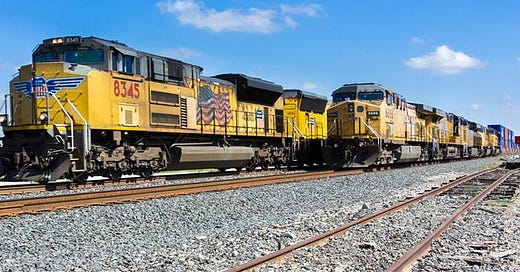Welcome Please Haul My Freight: Edition 25. Here are items in my notebook this week:
TRUCKLOAD SPOT MARKET: Our intra-June data shows van spot rates are flat month-over-month. Our JOC Shipper Truckload Spot Rate Index is down a fraction of a penny to $2.87 on a weighted basis and $3.12 on an unweighted basis. One year ago, rates were $2.92 on a weighted basis and $3.24 on an unweighted basis.
The bearish outlook is that it’s troubling since Memorial Day and July 4th is supposed to be busy and rates are supposed to go up, not stagnate.
The bullish outlook would view things on a two-year stacked basis (see chart). If 2H2022 trends between 2020 and 2021, is it really a bloodbath??
TRUCKLOAD CONTRACT MARKET: In a normal market, dry van spot rates are more expensive door-to-door than contract rates. Increasingly, however, that is not true. Let’s look at the JOC Shipper Truckload Spot Rate Index: 4,335 US lanes.
In January, contracts were cheaper than spot on 89% of lanes. In May, contracts were cheaper in only 23% of US lanes.
In other words, spot rates were cheaper than contracts in only 1 out of 10 lanes in January. Today they are cheaper on ~8 out of 10 lanes.
I highly recommend DAT Freight and Analytics on this topic.
INTERMODAL SPOT RATES: As I recently wrote, the spot truckload rates are falling enough that spot freight is beginning tendered to trucks instead of trains.
Our monthly JOC Spot Intermodal Savings Index average is 112.5 over the last 53 months, or 12.5% savings. Trucking gets super competitive when the index drops below 110 (10% savings), or a $0.10-$0.20 per mile spread.
In May, the JOC Spot ISI was 110.4 and the difference between spot truckload and spot intermodal rates was $0.19 per mile.
For intermodal contracts, it’s no competition. Intermodal saves A LOT of money. In May, the JOC Contract ISI was 131.9, and the spread between contract truckload and contract intermodal was $0.88 per mile. Our monthly JOC Contract Intermodal Savings Index average is 127.7 over the last 53 months.
INTERMODAL SERVICE: I’ve heard mixed views on domestic service in recent calls with intermodal marketing companies. Here is what one IMC told me:
“It's still very much a whack a mole type of environment. One minute, you got a problem here, and one minute, you got a problem there. I think that’s the common theme across all the Class Is in North America. The Canadian railroads are maxed out right now and continuing to have problems.”
Here is another IMC:
“Service in Q2 was better than in Q1, especially with the East Coast guys. I think CSX and NS have put some things in place and it has got a little bit better because they were a hot mess in the first quarter.”
Union Pacific Railroad has run into issues in Lathrop (NorCal) with traffic being diverted to Oakland. UP is aware of the issues and Lathrop is a point of emphasis as Schneider brings more volume in 2023. Some IMCs tell me NS Jacksonville is more fluid than in February, while others say the situation is unchanged.
We’ll discuss intermodal service with CSX, Mode Transportation, Schneider, and Union Pacific on Sept. 27 in Chicago. Hope to see you there!
DALLAS CONGESTION: International intermodal (IPI) congestion clogging terminals in Chicago and Memphis has spread to Dallas. BNSF Alliance is stacking boxes. Unlike Logistics Park Chicago, the BNSF Alliance ramp is structured only for wheeled operations, so BNSF is restricting cherry picking, according to truckers.
Here is what one drayman in Dallas told me:
“They have more than 2,000 containers stacked and they're short more than 2,500 chassis. BNSF believes it will be stacking through the July 4th holiday. BNSF is really nervous especially coming to the holiday with the streets dwell time.”
It boils down to chassis. As TRAC Intermodal told Transport Dive, there are cities where the average dwell time is three times longer today than pre-pandemic. No pool is fleeted to handle BCOs taking 3X longer to return chassis.
So who is sitting on chassis? Mostly Fortune 500 companies, as one dray exec told me:
“They can absorb 10 days of a chassis dwell. They have a better rate, a different demurrage rate, or a different per diem rate than someone that brings in 500 boxes per year in Dallas. Those smaller BCOs are going to try to turn their cargo much faster, in real time. I think that it’s a fair statement to say it’s the Fortune 500 companies.”
And I want to highlight a statement from Union Pacific that’s relevant here:
“It is important that end receivers consume these shipments in a timely manner so inland terminals remain fluid and we can continue to move containers.”
CSCMP REPORT: The 2022 Council of Supply Chain Management Professionals (CSCMP) State of Logistics report was released earlier this week. Bill Cassidy covered the event and wrote the story for The Journal of Commerce:
“Strategic partnerships are really critical,” said Jennifer Kobus, vice president of transportation and logistics for retailer Ulta Beauty. “They helped us make it through the pandemic. We're looking to improve [costs] in the second half as the market softens but we’re also looking to be a strong partner.”
Ulta Beauty revamped its trucking portfolio a few years ago, changing its procurement process. In a major change, “the annual RFP [request for proposal] is kind of dead,” Kobus said. The retailer replaced annual bids with a “continuous bidding process” for its lanes and business, she said. Kobus believes more shippers will move in that direction and make greater use of short-term mini-bids.
REVERSE IPI: Someone asked me about whether counterflow IPI is contributing to congestion in Chicago. I don’t think it’s a major contributor, but there is a jump in ocean containers arriving on East Coast and being railed to the West Coast, according to the Intermodal Association of North America.
The market share is very small, but perhaps it will change with a Hapag Lloyd service connecting the Port of Virginia to California.
NORFOLK SOUTHERN: The eastern US railroad sent out this notice about its terminal in Kentucky.
Beginning June 23rd, Appliance Park will not be able to accommodate any shipments ingating on a private chassis that will require a live lift. This temporary suspension will allow the terminal to increase fluidity and reduce driver dwell when live lift operations resume on Monday, June 27th.
NS has also the following IPI restrictions:
Memphis (Rossville) to Savannah (Garden City): 100 containers per day
Memphis to Jacksonville: total embargo
Jacksonville to Memphis: total embargo
Cincinnati to all destinations: 80 containers per day.
CSX is open but mandatory appointments are booked out several days in advance.
FMC REJECTION: Three Federal Maritime Commissioners are urging the US Surface Transportation Board to reject the Canadian Pacific-Kansas City Southern transactions in a filing June 22. Commissioners Bentzel, Sola, and Vekick write in part:
“We contend that while there might be economic benefits to certain shipper organizations and locations in the United States, that overall, there will be greater negative impacts relating to employment and long-term investment affecting intermodal shipments through U.S. ports.
Finally, the macro-economic loss of intermodal market share of U.S.-bound containerized cargo shipments from U.S. ports would adversely harm U.S. longshore and rail labor, port trucking companies, U.S.-based intermodal railways servicing U.S. ports, warehousing and distribution centers servicing U.S. ports, and other entities that handle cargo bound through U.S. ports.
Such economic losses will be far greater than any economic gain that might ensue as a result of a consolidation of the railroad systems of CP and KCS.”
OYEZ OYEZ OYEZ: The US Supreme Court will hear a case about whether New Jersey can unilaterally pull out of the Waterfront Commission of New York Harbor established in 1953. The commission was established to root out corruption, violence, and promote diversity at the Port of New York and New Jersey.
The US Supreme Court will not hear a case about a 2019 law in Oklahoma regulating how long trains could block railroad crossings. The United States Court of Appeals for the Tenth Circuit ruled struck down the Oklahoma statute, arguing the US Surface Transportation Board oversees train operations, not state lawmakers.
SUE ME: A food shipper MSRF Inc. filed a case before the US Federal Maritime Commission against HMM and Yang Ming alleging the two ocean carriers failed to meet their obligations to provide guaranteed capacity in their annual service contracts, causing $2.2 million in damages.
PORT OF BALTIMORE: Mediterranean Shipping Company has added the Port of Baltimore and the Port of Boston to its existing MSC Santana service. The first sailing will leave the Port of Haiphong in Vietnam on July 15, 2022. The Port of Baltimore recently announced new container service for Baltimore on ZIM Shipping Lines. Wan Hai has also added some new East Coast services.
PORT OF SAVANNAH: For the second consecutive summer, nearly 30 vessels are anchored outside the Port of Savannah. But I don’t hear nearly the anger as I did a year ago. I surmise BCOs don’t urgently need the freight like they did a year ago, but rather are juggling inventory challenges with the wrong freight at the wrong place, and thus a delay outside Savannah is not a major ordeal.
PORT OF CHARLESTON: The South Carolina Ports Authority will continue to offer Sunday gate hours through the end of September from 8:00 a.m. to 5:00 p.m. About 500 to 1,000 trucks visit the Charleston terminals on Sundays, and the port authority has found it to be a critical way to stay ahead of the volume rather than be buried on Monday mornings. The congestion paralyzing Charleston in Q1 is gone.
DUM SPIRO SPERO: South Carolina Governor Henry McMaster awarded Jim Newsome with The Order of the Palmetto, the top civilian honor in South Carolina. Newsome, CEO of the South Carolina Ports Authority, is officially retiring next week. SC Ports COO Barbara Melvin will take over July 1.
DRIVERLESS TRUCKS: A Swedish company Einride AB received federal approval for a pilot program of its autonomous trucks for two weeks on a one-mile stretch between two warehouses for GE Appliances in Tennessee, according to the Wall Street Journal. What’s different about this autonomous truck is that there is no cab whatsoever. The trucks, which are essentially pods, can carry 10 pallets of freight, or about 57,000 pounds.
JOC INLAND: If you enjoy Please Haul My Freight, register to attend the JOC Inland Distribution Conference at The Westin Chicago River North in September. Most of the content above will be on our agenda in Chicago. Hope to see you there.
Any opinions in this blog represent the author’s views, not the Journal of Commerce, IHS Markit, or S&P Global. Any rumors in this notebook are just that: rumors. Unconfirmed. Not news stories.
Do you have an opinion or a subject you’d like me to cover? Email me ari.ashe@spglobal.com to send your thoughts.
You may also request the data behind JOC’s Intermodal Savings Index and JOC’s Shipper Truckload Spot Rate Index, available to paying JOC subscribers. Not a subscriber? Click here to become one.











